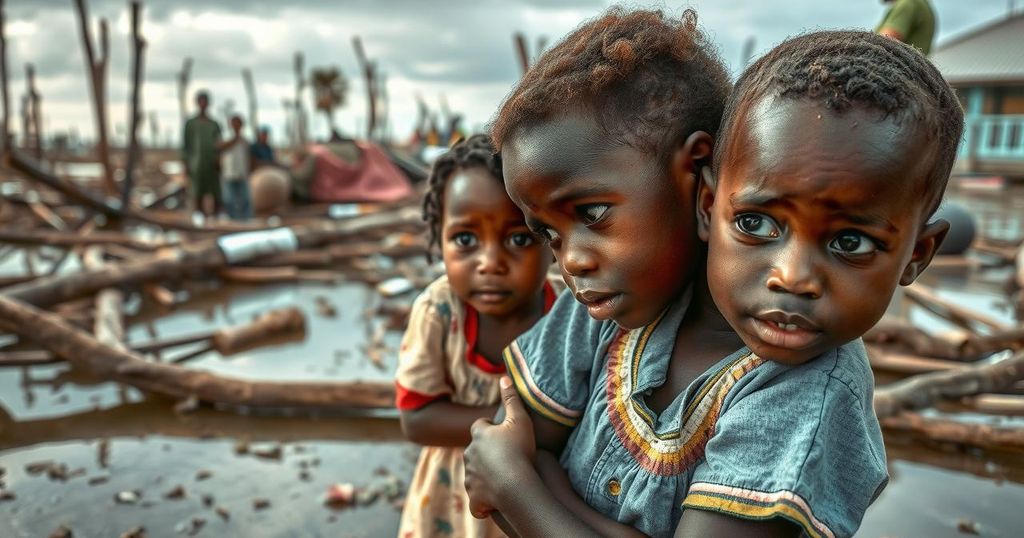Approximately 90,000 Children Affected by Cyclone Chido in Mozambique

Tropical Cyclone Chido recently struck northern Mozambique, affecting around 90,000 children and damaging thousands of homes and classrooms. More than 174,000 individuals are impacted, amidst prior challenges of conflict and health crises. UN agencies are mobilizing aid, while the risk of worsening cholera outbreaks and food insecurity looms as assessments continue.
Cyclone Chido recently impacted northern Mozambique, causing widespread devastation, particularly in Cabo Delgado province. The cyclone unleashed torrential rains and fierce winds, damaging or destroying over 35,000 homes and displacing countless families, while affecting approximately 90,000 children, as reported by the United Nations Children’s Fund (UNICEF). Overall, initial assessments indicate that approximately 174,000 people in the region are already affected, with numbers expected to rise as evaluations continue.
The storm has severely compromised educational infrastructures, with 186,000 classrooms reported destroyed and 20 health facilities damaged. The cyclone made landfall near Pemba city, resulting in significant destruction of civilian infrastructure, including electricity and communication systems. Mary Louise Eagleton, the UNICEF Representative in Mozambique, stated, “Mozambique is considered one of the most affected countries in the world by climate change; children were already experiencing several life-threatening emergencies before Cyclone Chido, including conflict, drought, and disease outbreaks.”
Cabo Delgado has faced persistent conflict for the past seven years, displacing over 1.3 million residents, primarily women and children. The devastation from Cyclone Chido has deepened the struggles of many families, erasing the limited progress they had achieved. Additionally, the cyclone’s impact extended to Nampula and Niassa provinces, where over 25,000 families have lost electricity and water infrastructure has sustained significant damage. Amidst an ongoing cholera outbreak, UNICEF warned the cyclone’s consequences may exacerbate health risks in affected areas, prompting the World Health Organization (WHO) to deploy health experts for urgent assessments.
In the immediate aftermath, UNHCR has mobilized aid efforts in Pemba, where over 2,600 individuals have received emergency relief supplies, such as blankets and shelter essentials. Eujin Byun, the spokesperson for UNHCR, remarked, “While the full extent of the damage in rural areas remains unclear, preliminary assessments suggest that around 190,000 people urgently need humanitarian assistance, and 33 schools have been affected, with nearly 10,000 homes destroyed. In some villages, very few houses remain standing.”
UN Secretary-General António Guterres has expressed the organization’s readiness to deliver essential assistance in the region. Nonetheless, the UN Office for the Coordination of Humanitarian Affairs reported that limited supplies are hindering relief efforts, prompting the allocation of $4 million for initial humanitarian response. The World Food Programme (WFP) has announced plans to scale up its efforts to address food insecurity affecting nearly 3.3 million people projected to be in crisis or elevated food insecurity levels next year.
Further, Cyclone Chido wreaked havoc in Mayotte, a French overseas territory, leading to fatalities and severe infrastructure damage, particularly impacting vulnerable communities including refugees. Southern Malawi also experienced detrimental effects from the cyclone, which included destructive winds and rains across several areas, with agencies closely monitoring the situation and collaborating with local partners.
Tropical Cyclone Chido made landfall in northern Mozambique, particularly impacting Cabo Delgado province, which has been grappling with a prolonged conflict exacerbating humanitarian crises in the region. The cyclone has not only caused physical destruction but has also increased vulnerability to health issues and food insecurity for an already at-risk population. Various international organizations, including UNICEF, UNHCR, and WHO, have mobilized resources to respond to the extensive needs generated by the cyclone’s aftermath. This event occurs against a backdrop of Mozambique facing numerous challenges due to climate change, economic instability, and public health crises.
Cyclone Chido has left a significant mark on northern Mozambique, affecting thousands of children and families across various communities. The immediate response from international agencies highlights both the urgency and the immense challenges associated with providing humanitarian assistance in a region already grappling with complex crises. Continued support and resources are critical in addressing the aftermath of the cyclone and ongoing vulnerabilities faced by the affected populations.
Original Source: news.un.org






